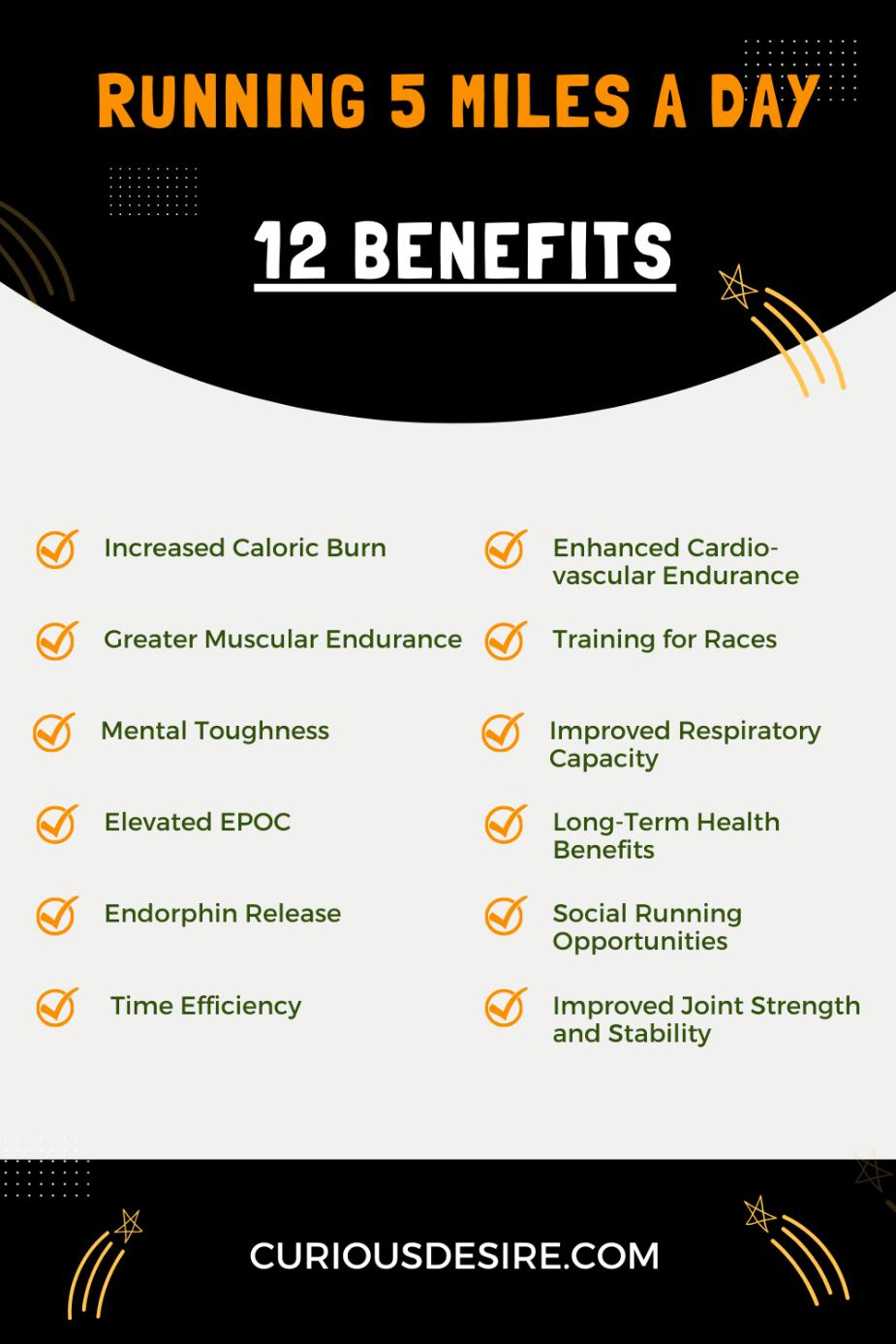When it comes to running, people set a wide range of goals. Some eagerly take on the challenge of running 5 miles every day, motivated by the expectation of enjoying specific benefits.
In this article, we’ll explore the advantages of such a routine, exploring the positive impacts that running 5 miles can have on your health and overall well-being.
Here are the top 5 benefits of running 5 miles a day:
- Increased Caloric Burn
- Greater Muscular Endurance
- Improved Respiratory Capacity
- Endorphin Release
- Time Efficiency
[toc]

Benefit 1: Increased Caloric Burn
Running 5 miles significantly increases the number of calories your body burns. When you run, your muscles work hard, and this effort demands energy.
According to Healthline and as mentioned by USA Today, running is noted for burning the most calories compared to various exercises.
The longer you run, the more energy your body needs, leading to a higher calorie burn.
This is especially beneficial for those seeking to manage their weight because burning more calories can contribute to weight loss or help maintain a healthy weight.
Benefit 2: Enhanced Cardiovascular Endurance
Cardiovascular endurance is the enduring power of your heart and lungs. When you run 5 miles, it puts a good challenge on these vital organs, pushing them to work better over a longer time.
Think of your heart as a strong pump that delivers oxygen and nutrients to your muscles. As you run longer distances, your heart gets better at this pumping job, and your lungs get more efficient at taking in oxygen.
According to WebMD, you can boost your cardiovascular endurance by doing exercises that get your heart and breathing rates up, like aerobic exercises.
This upgraded endurance doesn’t just help you run better; it also does wonders for your overall heart health, slashing the risk of serious issues like heart attacks and strokes.
Benefit 3: Greater Muscular Endurance
Muscular endurance is all about your muscles keeping up the good work for a long time without waving the white flag of tiredness.
Fitpage, in one of its articles, refers to long-distance running as a form of muscular endurance training, stating that every time you run for longer distances and durations, you improve that element of your physical fitness.
Now, when you’re hitting the pavement for a 5-mile run, your leg muscles—calves, thighs, and buttocks—are in for a marathon of their own.
As these muscles get used to this sustained effort, they get stronger over time.
Running 5 Miles A Day Benefits FAQs
Will I lose weight if I run 5 miles a day?
Running 5 miles a day can contribute to weight loss, as it burns a significant number of calories.
However, weight loss also depends on factors like diet, metabolism, and overall activity level.
Consistency and a balanced approach, combining exercise with a healthy diet, are key for effective weight management.
Does running 5 miles a day build muscle?
While running primarily engages cardiovascular fitness, it also involves muscles, especially in the legs.
Running alone may not build significant muscle mass, but it can contribute to muscle toning and endurance.
Combining running with strength training exercises can provide a more comprehensive approach to muscle development.
How many miles should you run per day?
The ideal mileage varies based on fitness goals, experience, and overall health.
Beginners might start with shorter distances and gradually increase. Generally, running 3-5 times a week, with a mix of short and long runs, is a common approach.
The total weekly mileage can vary but should align with individual fitness levels and goals.
Can running reduce belly fat?
Running, along with a healthy diet, can help reduce overall body fat, including belly fat.
However, spot reduction is challenging, so a comprehensive fitness plan that includes both cardio and strength training is effective for overall fat loss.
Does running tone your stomach?
Running engages core muscles, contributing to toning and strengthening the stomach area.
While it’s not a direct route to a six-pack, running can be part of an effective strategy for overall abdominal toning when combined with targeted core exercises.
How much weight can I lose in 1 month by running?
Weight loss varies among individuals, but a safe and sustainable rate is around 1-2 pounds per week.
Therefore, a reasonable expectation for one month of consistent running, combined with a healthy diet, could be 4-8 pounds.
Will I lose weight if I run for 30 minutes every day?
Running for 30 minutes daily can contribute to weight loss, provided your overall calorie intake is appropriate.
Consistency is key, and incorporating variety in your workouts helps prevent plateaus.
How can I lose 10 pounds in a month by running?
To lose 10 pounds in a month, you’ll need a combination of running, a calorie-controlled diet, and possibly strength training.
It’s essential to set realistic goals and prioritize overall health rather than pursuing rapid, unsustainable weight loss.
How long before you see weight loss with running?
Individual results vary, but some people may start to notice changes in a few weeks.
Sustainable weight loss often occurs over several months with a combination of regular running and a balanced diet.
Where do you lose weight first when running?
There’s no guaranteed order for weight loss in specific areas.
Genetics play a role, and weight loss tends to occur proportionally across the body. Consistent exercise and a healthy diet contribute to overall fat loss.
What happens if you run every day for a month?
Running every day for a month can improve cardiovascular fitness, boost mood, and contribute to weight loss. However, rest days are crucial to prevent overtraining and reduce the risk of injuries.
Should I run faster or longer to lose weight?
A combination of both intensity (running faster) and duration (running longer) is effective for weight loss. High-intensity intervals can increase calorie burn, while longer runs contribute to overall energy expenditure.
Why does running not help me lose weight?
Several factors can influence weight loss, including diet, metabolism, and overall lifestyle.
If running alone isn’t yielding results, consider evaluating and adjusting your diet, incorporating strength training, and ensuring a balance between calories consumed and burned.
Consulting with a healthcare or fitness professional can provide personalized guidance.
